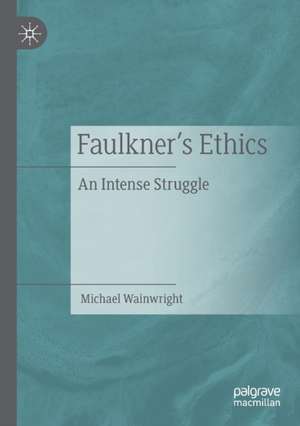Faulkner’s Ethics: An Intense Struggle
Autor Michael Wainwrighten Limba Engleză Paperback – 30 mai 2022
| Toate formatele și edițiile | Preț | Express |
|---|---|---|
| Paperback (1) | 781.77 lei 6-8 săpt. | |
| Springer International Publishing – 30 mai 2022 | 781.77 lei 6-8 săpt. | |
| Hardback (1) | 786.10 lei 6-8 săpt. | |
| Springer International Publishing – 29 mai 2021 | 786.10 lei 6-8 săpt. |
Preț: 781.77 lei
Preț vechi: 953.37 lei
-18% Nou
Puncte Express: 1173
Preț estimativ în valută:
149.61€ • 155.62$ • 123.51£
149.61€ • 155.62$ • 123.51£
Carte tipărită la comandă
Livrare economică 15-29 aprilie
Preluare comenzi: 021 569.72.76
Specificații
ISBN-13: 9783030688745
ISBN-10: 3030688747
Ilustrații: X, 319 p.
Dimensiuni: 148 x 210 mm
Greutate: 0.44 kg
Ediția:1st ed. 2021
Editura: Springer International Publishing
Colecția Palgrave Macmillan
Locul publicării:Cham, Switzerland
ISBN-10: 3030688747
Ilustrații: X, 319 p.
Dimensiuni: 148 x 210 mm
Greutate: 0.44 kg
Ediția:1st ed. 2021
Editura: Springer International Publishing
Colecția Palgrave Macmillan
Locul publicării:Cham, Switzerland
Cuprins
Introduction.- 1 Authorial Irresponsibility: Hemingway’s “The Battler” and Faulkner’s “Barn Burning”.- 2 The Benevolence of Self-Sacrifice: Kenosis in William Faulkner’s Light in August.- 3 William Faulkner, John Bowlby and Strains of Familial Attachment in Pylon.- 4 Egoistic Hedonism: Thomas Sutpen’s Dubious Guide to an Ignoble End in Absalom, Absalom!.- 5 The Moral Mathematics of Strategic Games in The Unvanquished.- 6 The Gifted Presence of Intruder in the Dust.- 7 A Fable: Buchwald’s Disfiguring of Faulkner’s Modernisms.- Conclusion: The Levine Shadow.
Notă biografică
Michael Wainwright is an Honorary Research Associate in the Department of English at Royal Holloway, University of London, UK.
Textul de pe ultima copertă
‘Early Faulkner criticism often followed the trajectory of Faulkner’s life, sometimes simply assuming that life had a moral compass. Later schools, for example historical materialism, sought the ‘substratum’ of material reality that underpinned the narrative, again only assuming that issues, such as the nature and economics of labor, had moral implications. Psychology, anthropology, mythology—all have had their day, often very useful days, often touching on ethical issues—but what has been lacking is ethics itself. Michael Wainwright’s Faulkner’s Ethics: An Intense Struggle will end that neglect and, I believe, spur a new interest in moral struggle, moral direction as it can be found in Faulkner’s life and literature.’
- Charles A. Peek, Professor Emeritus, Department of English, University of Nebraska Kearney, USA
This book offers the first comprehensive investigation of ethics in the canon of William Faulkner. As the fundamental framework for its analysis ofFaulkner’s fiction, this study draws on The Methods of Ethics, the magnum opus of the utilitarian philosopher Henry Sidgwick. While Faulkner’s Ethics does not claim that Faulkner read Sidgwick’s work, this book traces Faulkner’s moral sensitivity. It argues that Faulkner’s language is a moral medium that captures the ways in which people negotiate the ethical demands that life places on them. Tracing the contours of this evolving medium across six of the author’s major novels, it explores the basic precepts set out in The Methods of Ethics with the application of more recent contributions to moral philosophy, especially those of Jacques Derrida and Derek Parfit.
- Charles A. Peek, Professor Emeritus, Department of English, University of Nebraska Kearney, USA
This book offers the first comprehensive investigation of ethics in the canon of William Faulkner. As the fundamental framework for its analysis ofFaulkner’s fiction, this study draws on The Methods of Ethics, the magnum opus of the utilitarian philosopher Henry Sidgwick. While Faulkner’s Ethics does not claim that Faulkner read Sidgwick’s work, this book traces Faulkner’s moral sensitivity. It argues that Faulkner’s language is a moral medium that captures the ways in which people negotiate the ethical demands that life places on them. Tracing the contours of this evolving medium across six of the author’s major novels, it explores the basic precepts set out in The Methods of Ethics with the application of more recent contributions to moral philosophy, especially those of Jacques Derrida and Derek Parfit.
Caracteristici
Provides the first in-depth analysis of ethics across six of Faulkner’s major novels Draws on Henry Sidgwick’s “The Methods of Ethics”, as well as applying more recent contributions to moral philosophy from Jacques Derrida and Derek Parfit Explores Faulkner’s moral language and his exploration of responsibility, duty, benevolence and universalism
